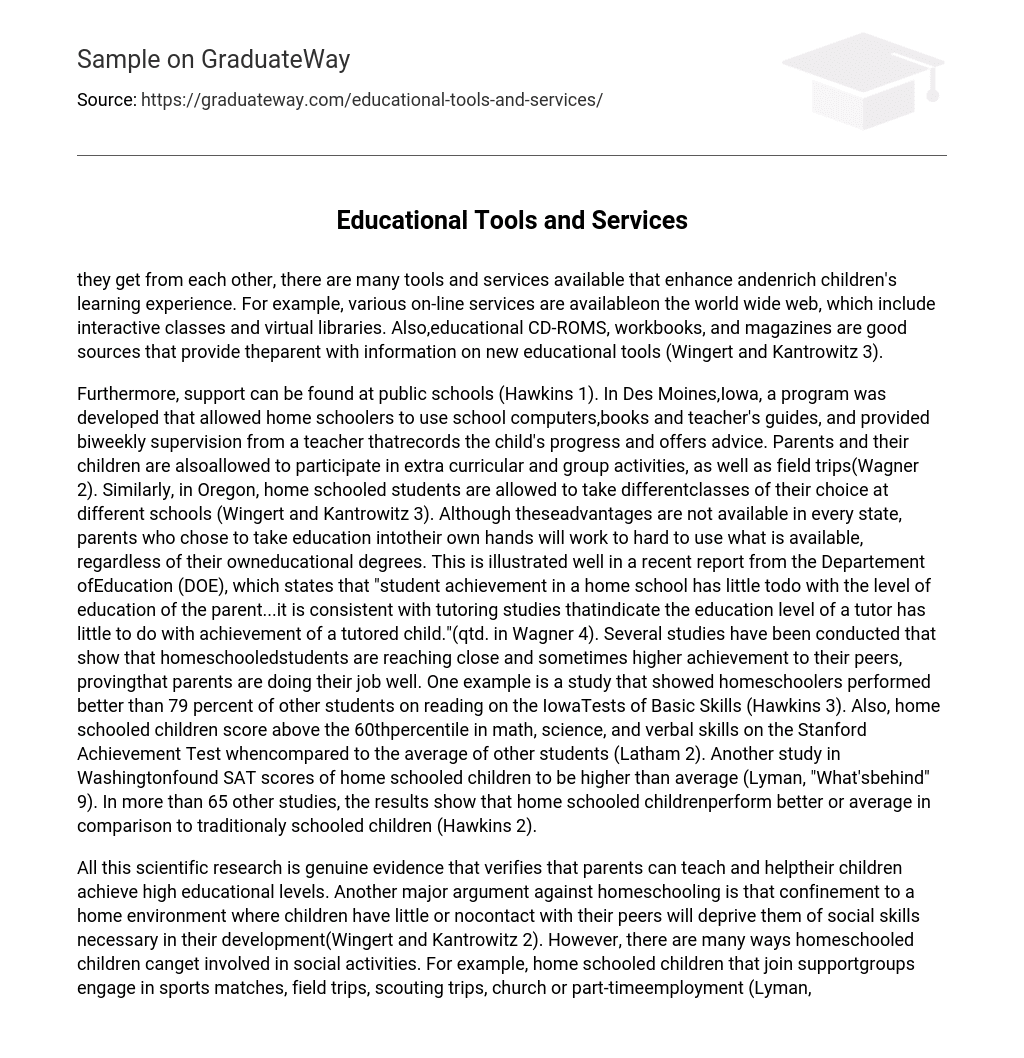they get from each other, there are many tools and services available that enhance andenrich children’s learning experience. For example, various on-line services are availableon the world wide web, which include interactive classes and virtual libraries. Also,educational CD-ROMS, workbooks, and magazines are good sources that provide theparent with information on new educational tools (Wingert and Kantrowitz 3).
Furthermore, support can be found at public schools (Hawkins 1). In Des Moines,Iowa, a program was developed that allowed home schoolers to use school computers,books and teacher’s guides, and provided biweekly supervision from a teacher thatrecords the child’s progress and offers advice. Parents and their children are alsoallowed to participate in extra curricular and group activities, as well as field trips(Wagner 2). Similarly, in Oregon, home schooled students are allowed to take differentclasses of their choice at different schools (Wingert and Kantrowitz 3). Although theseadvantages are not available in every state, parents who chose to take education intotheir own hands will work to hard to use what is available, regardless of their owneducational degrees. This is illustrated well in a recent report from the Departement ofEducation (DOE), which states that “student achievement in a home school has little todo with the level of education of the parent…it is consistent with tutoring studies thatindicate the education level of a tutor has little to do with achievement of a tutored child.”(qtd. in Wagner 4). Several studies have been conducted that show that homeschooledstudents are reaching close and sometimes higher achievement to their peers, provingthat parents are doing their job well. One example is a study that showed homeschoolers performed better than 79 percent of other students on reading on the IowaTests of Basic Skills (Hawkins 3). Also, home schooled children score above the 60thpercentile in math, science, and verbal skills on the Stanford Achievement Test whencompared to the average of other students (Latham 2). Another study in Washingtonfound SAT scores of home schooled children to be higher than average (Lyman, “What’sbehind” 9). In more than 65 other studies, the results show that home schooled childrenperform better or average in comparison to traditionaly schooled children (Hawkins 2).
All this scientific research is genuine evidence that verifies that parents can teach and helptheir children achieve high educational levels. Another major argument against homeschooling is that confinement to a home environment where children have little or nocontact with their peers will deprive them of social skills necessary in their development(Wingert and Kantrowitz 2). However, there are many ways homeschooled children canget involved in social activities. For example, home schooled children that join supportgroups engage in sports matches, field trips, scouting trips, church or part-timeemployment (Lyman, “What’s behind” 7). Also, those who take classes and join extrracircular activities in public schools and other learning centres interact with peers (Wingertand Kantrowitz 3). Even if some children do not have contact with people of the sameage because of the small size of a suport group, they are still gaining a lot of social skills.
For example, the oldest learns leadership when speaking to or guiding younger children.
The youngest learns to respect elders. This offers the same or even more self-esteem andsocial understanding than a traditional school environment would provide (Wagner 2).
Scientific research also supports the fact that homeschooled children are not sociallydeprived. One study at the University of Florida was conducted in which eight to tenyear old children, some of them home schooled, were taped on video while playing.
Professional counselors, who were unaware of which children were home schooled,watched the video and found no difference between the home schooled children and theothers. Social development tests showed that the children rated closely in self-conceptand assertion (Lyman, “What’s behind” 7). Another test showed that home schooledchildren scored higher on self-concept than public school students (Latham 1). To studylong term effects of home schooling on socialization, a different study was conductedwith 53 adults of the first generation of home schoolers. The researcher, Gary J.
Knowles of the University of Michigan, states that he has “found no evidence that theseadults were even moderately disadvantaged…Two-thirds of them were married, thenorm for adults their age, and none were unemployed or any on any form of welfareassistance. More than three-quarters felt that being taught at home had actually helpedthem to interact with people from different levels of society.” (Lyman, “What’s behind”9). The studies and research so far shows that home schooling is not disadvantageous incomparison to normal schooling. I believe that there is still no strong evidence thatverifies that home schooling is more beneficial to children than public schooling. Perhapsthe new generation of homeschoolers will reveal that this is not so, but that remains to befound. In the meantime, as long as parents have the time and patience, can provide theirchildren with social exposure, and have access to educational tools, there is no reasonwhy they cannot home school their children. However, this is where the governmentcomes in. If home schooling is legalized, then there should be services and schools tosupport home schoolers. Parents can teach their children efficiently, it they have otherhomeschoolers to help them and if services are available. Research on test scores provesthat parents are succeeding. Support groups, public schools and other services helpchildren acquire social skills, and research again confirms that they do not lack in socialskills. Home schooling rates closely to public schooling in the overall educational andsocial experience of the child. And yet it is still quite a surprise that a parent can raise achild to be president. Perhaps it is the opportunity home schooling gives youngsters tofollow their interests, beliefs, and dreams that may be pulled away in school years beforethey are even discovered. Or perhaps it is the bond created between the mother whenfor the first time she watches her child write his name. Whatever the case may be, thingswould have probably been reallly different if Washington, Roosevelt, and Edison werewatched over by the high school principal, instead of their parents.
Bibliography:





